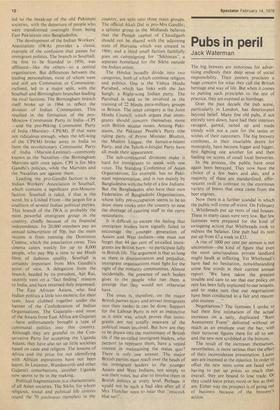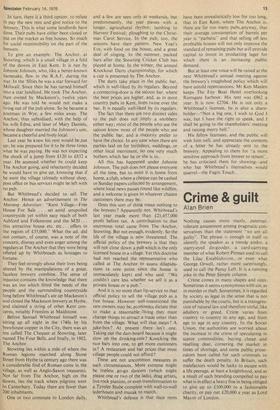Pubs in peril
Jack Waterman
The big brewers are notorious for advertising endlessly their deep sense of social responsibility. Their posters proclaim a huge concern for what they call the British heritage and way of life. But when it comes to putting such principles to the test of practice, they are exposed as humbugs.
Over the past decade the pub scene, particularly in London, has deteriorated beyond belief. Many fine old pubs, if not entirely torn down, have had their interiors ravaged, gutted, tarted up and made trendy with not a care for the tastes or wishes of their customers. The big brewery combines, in their insatiable desire for monopoly, have become bigger and bigger, first fighting one another for and then feeding on scores of small local breweries.
In the process, the public have once again been betrayed. They now have the choice of a few beers and ales, and a majority of these are standardised, effervescent swill in contrast to the enormous variety of brews that once came from the beer engines.
Now there is a further scandal in which the public will come off worst. On February 1, Whitbreads put up rents of tied houses. These in many cases were very low. But few licensees were prepared for the kind of swingeing action that Whitbreads took to redress the balance. One pub had its rent put up from £3 a week to £33.
A rise of 1000 per cent per annum is not uncommon—the kind of figure that even the most unscrupulous private landlord might baulk at inflicting. Yet Whitbread's have had no hesitation, notwithstanding some fine words in their current annual report: 'We have taken the greatest trouble and care to see that our policy on rent has been fully explained to our tenants, and to make sure that our negotiations have been conducted in a fair and reasonable manner. ..."
Negotiations? The licensees I spoke to had their first intimation of the actual increases on a tatty, duplicated "Rent Assessment Form" delivered without so much as an envelope over the bar, with their turnover figures there for all to see, and the new rent scribbled at the bottom.
The result of the increases themselves, nevertheless, is more serious than the effect of their inconsiderate presentation. Licensees are incensed at the injustice. In order to offset the new rents some are faced with having to put up prices so much that, overall, they are bound to lose trade. Or they could leave prices more or less as theY are. Either way the prospect is of going nut of business because of the brewery s action.
In turn, there is a third option: to refuse to pay the new rent and give notice to the brewery. This is what some landlords have done. Their pubs have either been closed or Put on the market as free houses. So much for social responsibility on the part of the brewers.
To give an example: The Anchor, at Stowting, which is a small village in a fold of the downs in East Kent. It is run by Johnnie Johnson, who, like a better-known namesake, flew in the R.A.F. during the war. In the 'fifties he was a star forward for Millwall. Since then he has turned himself into a star landlord. He took The Anchor, then owned by Mackeson's, twelve years ago. He was told he would not make a living out of the pub alone. So he became a postman in Wye, a few miles away. The Anchor, thus subsidised, with the help of his wife Edna, and later of Mary Daniels, whose daughter married the Johnson's son, became a cheerful and lively local.
Last year he knew his rent would be put up; he was prepared for it to be three times what he was paying. He was not expecting the shock of a jump from £120 to £832 a year. He assessed whether he could keep The Anchor going, and reluctantly decided he would have to give up, knowing that if he went the village (already without shop, post office or bus service) might be left with no pub.
But Whitbread's decided to sell The Anchor. Hence an advertisement in The Morning Advertiser: "Kent Village—Free House For Sale . . . set amid unspoiled countryside yet within easy reach of both Ashford and Folkestone and the M20. this attractive house etc. etc .. . offers in the region of £35,000." What the ad. did not contain, of course, was a note of the concern, dismay and even anger among the regulars at The Anchor that they were being offered up by Whitbreads as hostages to fortune.
They feel strongly about their lives being altered by the manipulations of a great, faceless brewery combine. The sense of injustice contains the knowledge that there was an inn which fitted the needs of the people and the surrounding countryside long before Whitbread's ate up Mackeson's and closed the Mackeson brewery at Hythe, and claimed a string of other Kent concerns, notably Fremlins at Maidstone.
Before Samuel Whitbread himself was sitting up all night in the 1740s by his brewhouse copper in the City, there was an inn called The Chequer at Stowting, later named The Four Bells, and finally, in 1802, The Anchor.
Stowting lies within a mile of where the Roman legions marched along Stone Street from Hythe (a century ago there was a considerable find of Roman coins in the village, as well as Anglo-Saxon treasures). Not far from The Anchor, high on the downs, lies the track where pilgrims went to Canterbury. Today there are fewer than 200 inhabitants.
One or two commute to London daily, and a few are seen only at weekends, but predominantly, the year passes with a longer, agricultural rhythm: lambing to Harvest Festival; ploughing to the Christmas Carol Service. In the pub, too, the seasons have their pattern. New Year's Eve, with food on the house, and a great deal of singing. In the summer, packed bars after the Stowting Cricket Club has played at home. In the winter, the annual Knockout Darts championship, for which a cup is presented by The Anchor.
The darts take place in the public bar, which is well-liked by its regulars. Beyond a connecting-door is the saloon bar, where the beer prices are higher, and, as in most country pubs in Kent, hops twine over the bar. It is equally well-liked by its regulars.
The fact that there are two distinct sides to the pub does not imply a snobbery either way; most of the people who use the saloon know most of the people who use the public bar, and a majority prefer to have the choice. In any case when there are parties laid on for birthdays, weddings, or other local merriment, no one very much bothers which bar he or she is in.
All this has happened under Johnnie Johnson. The pub does not please everyone all the time, but to most it is home from home, a club, where a cheque can be cashed or Sunday papers collected by arrangement, where local news passes round like wildfire, and a welcome is given to whatever chance customers there may be.
Does this sort of thing mean nothing to the brewers ? Apparently not. Whitbread's last year made more than £21,457,000 profit before tax. A contribution to that enormous total came from The Anchor, Stowting. But not enough, evidently. So the life of the village is now threatened. The official policy of the brewery is that they will not close down a pub which is the only licensed house in a village. Yet this doctrine had not reached the representative who called at The Anchor to assess dilapidations (a sore point since the house is immaculately kept) and who said: "We couldn't care less whether we sell it as a private house or a pub."
And it is no more than lip-service to that official policy to sell the village pub as a free house. However well-intentioned the new owners may be, economics dictate that to make a reasonable living they must change things to attract a trade other than from the village. What will that mean ? A juke-box? At present there isn't one. Taking out the dart-board because it might slow up the drinking-rate? Knocking the two bars into one, to get more customers in ? A restaurant and bar prices that most village people could not afford ?
These are not uncommon measures in such circumstances. More extreme might be topless go-go dancers (which might please one or two of the lads), drag artists, live rock pianists, or even transformation to a Tyroler Stube complete with wall-to-wall lederhosen and muzak to match.
Whitbread's defence is that their rents have been unrealistically low for too long, that in East Kent, where The Anchor is. there are far too many pubs,anyway, that their average consumption of barrels per year is "pathetic" and that selling off less profitable houses will not only improve the standard of remaining pubs but will provide • capital to invest in producting lager for which there is an increasing public demand.
But at least one voice will be raised at the next Whitbread's annual meeting against the brewery's roughshod policy which will have untold repercussions. Mr Ken Maslen keeps The Foy Boat Hotel overlooking Ramsgate harbour. His rent was £962 a year. It is now £2704. He is not only a Whitbread's licensee, he is also a shareholder—"Not a big one, I wish to God I was, but I have the right to speak, and I shall be going to the shareholders' meeting and raising merry hell."
His fellow licensees, and the public will wish him well, and appreciate the contents of a letter he has already sent to the brewery. Appealing to them for "a more sensitive approach from brewer to tenant", he has criticised them for showing--and who but Whitbread's themselves would quarrel—the Fagin Touch.



































 Previous page
Previous page